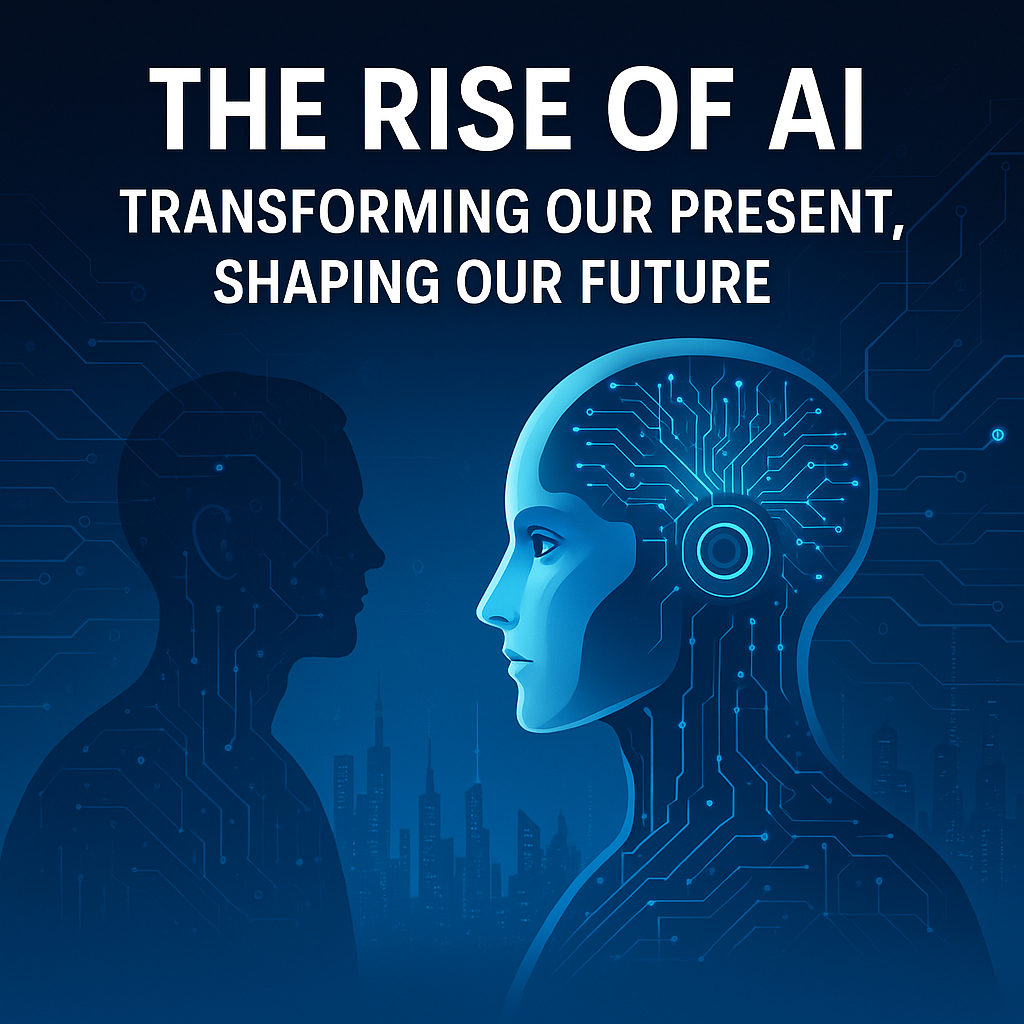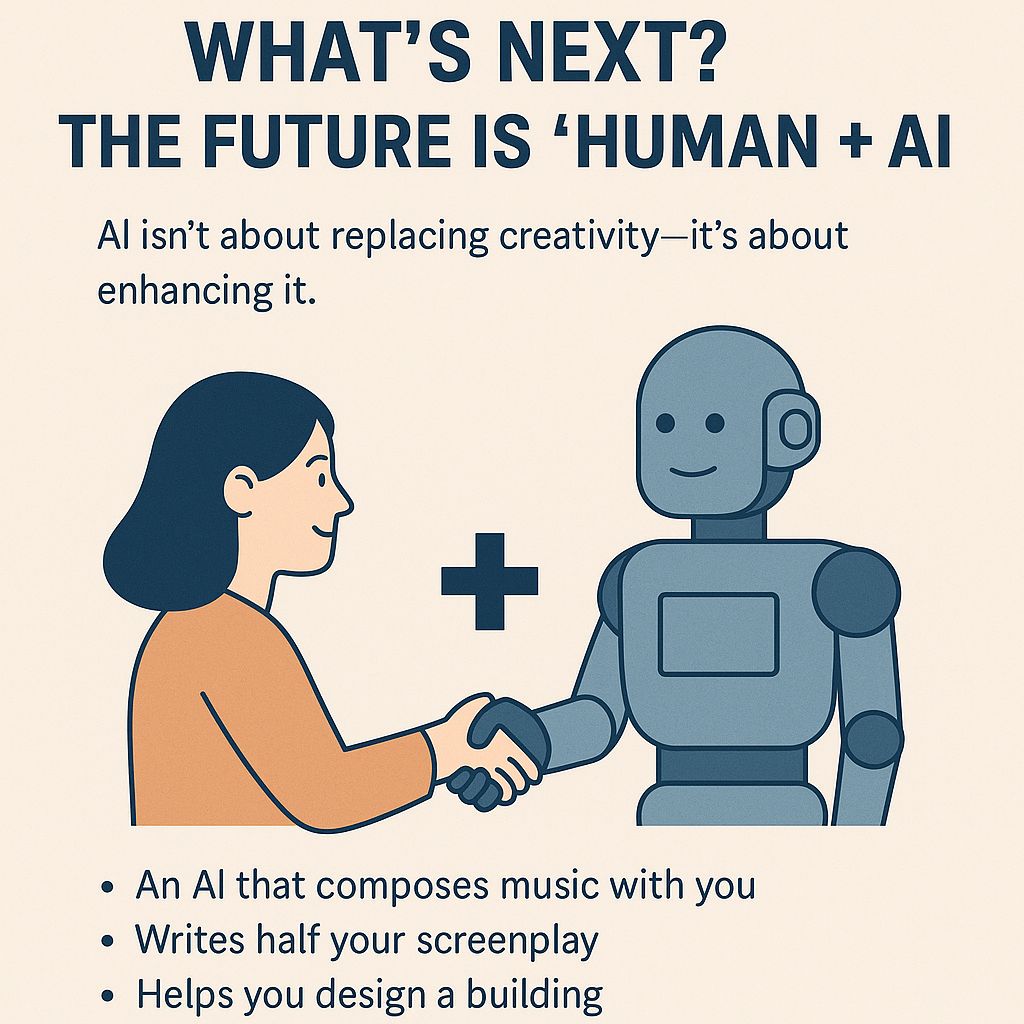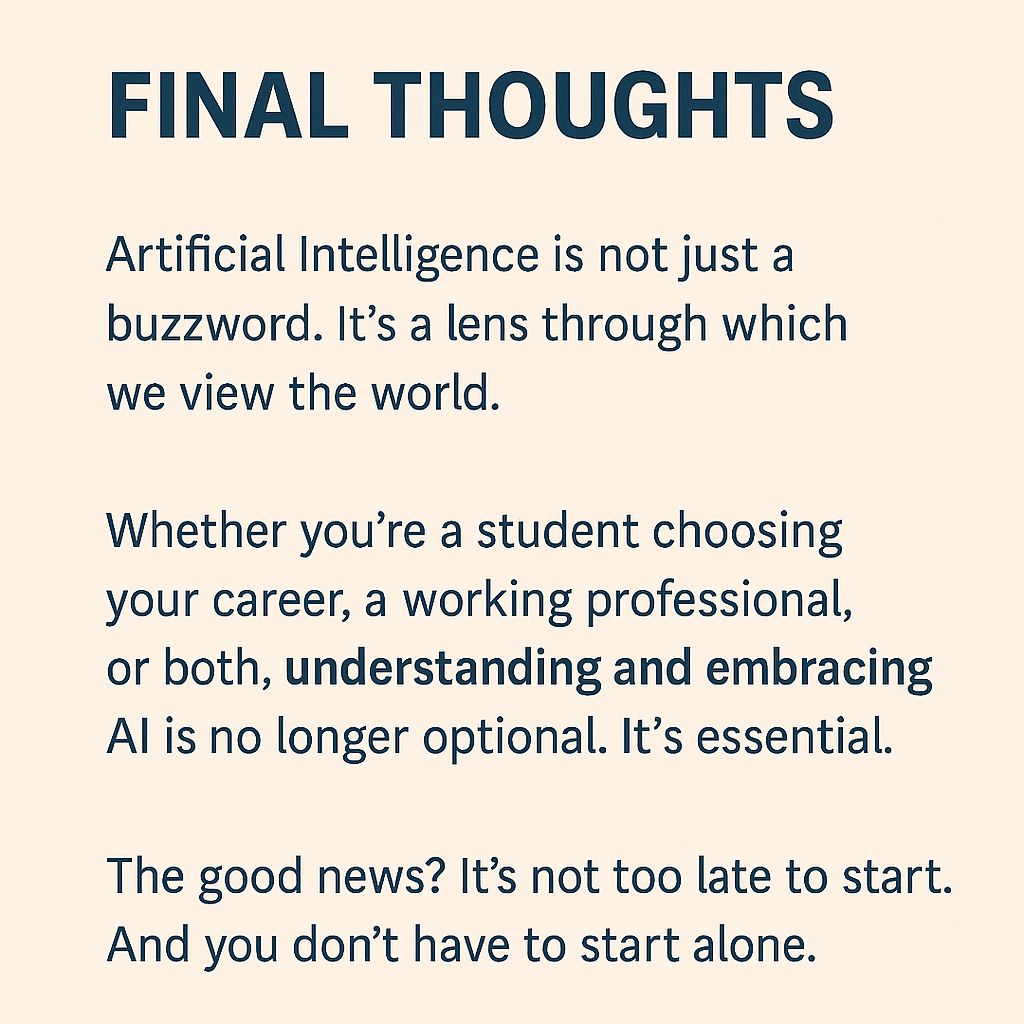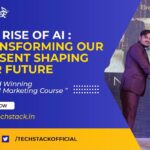By [Manoj Singh Rathore] | August 2025
From Nolan to Now: Living the AI Revolution
The AI Revolution felt like a concept pulled straight out of a Christopher Nolan film just a few years ago. Fast forward to 2025, and it’s in your phone, your car, your playlists—and even your hiring interviews. AI is no longer the future. It’s the now.

But what exactly is it doing? And where is it heading?
Let’s dive deeper—beyond the buzzwords—and explore how AI is silently transforming industries, careers, and human potential.
What is Artificial Intelligence, Really?
Strip away the jargon—AI simply means machines that can “think,” “learn,” and “decide” like humans (or in some cases, better than humans).
From Netflix suggesting your next binge to Tesla avoiding an accident before you even see it—these aren’t coincidences. They’re algorithms in action.
But AI isn’t a single technology. It’s an umbrella term that includes:
- Machine Learning: Algorithms that learn from data
- Natural Language Processing (NLP): Making machines understand human language (like Siri or ChatGPT)
- Computer Vision: Helping machines “see” and recognize images or video
- Deep Learning: Neural networks mimicking the human brain
Each of these branches work in harmony or independently depending on the application. Think of AI not as a single brain, but as a family of minds trained to solve specific problems.
AI Is Not Taking Your Job—But It Might Take Your Task

There’s a growing fear that AI will “replace” humans at work. Truth? AI won’t replace you—but someone using AI might.
Today’s professionals are leveraging AI to automate reports, write emails, design campaigns, and analyze customer behavior. From marketing to medicine, AI isn’t stealing jobs—it’s creating a demand for smarter skillsets.
Want to stay ahead? Learn how to work with AI, not against it. Here’s what it means in practice:
- Upskill in tools like ChatGPT, MidJourney, DALL·E, and Google Bard
- Learn AI-integrated platforms like Notion AI, Copy.ai, and GrammarlyGO
- Combine your domain knowledge with AI to work faster, better, smarter
In other words, be the human who tells AI what to do—not the one replaced by it.
Real-World Applications: Not Theory, But Impact
Let’s break the myth: AI is not just for scientists. It’s now a toolkit for every industry. Here’s how it’s transforming sectors:
| Industry | AI in Action |
|---|---|
| Healthcare | Diagnosing diseases faster than doctors, predicting patient risks, robotic surgeries |
| Retail | Personalized shopping experiences, inventory predictions, AI chatbots |
| Finance | Fraud detection, credit scoring, algorithmic trading |
| Education | Personalized learning paths, automated grading, AI tutoring |
| Agriculture | Crop monitoring, pest detection, precision farming with drones |
| Marketing | Predictive analytics, content generation, ad optimization |
| Cybersecurity | Threat detection, automated vulnerability scanning, fraud alerts |
AI has moved beyond “potential” to proven impact. For example, Google’s DeepMind AI helped reduce energy usage in data centers by 40%, saving millions. That’s not just smart—it’s sustainable.
Ethics & Responsibility: Who Teaches AI Right from Wrong?
With great power comes great responsibility—and AI is no exception.
As machines make decisions that affect people’s lives, the question becomes: Can they be fair, ethical, and transparent?
AI can only be as unbiased as the data it learns from—and data is often messy and flawed. Without care, AI can learn human prejudice, amplify it, and scale it globally. Examples already exist in facial recognition bias and hiring algorithms that favored certain groups.
This is why Responsible AI is now a core global agenda. Companies and developers are building ethics into their systems using these methods:
- Bias detection and mitigation
- Diverse training datasets
- Transparent model auditing
- Human-in-the-loop decision models
In 2025, ethics is not optional—it’s built into the code.
AI for Everyone: Not Just for Coders
The beauty of modern AI? You don’t need to be a programmer to use it.
Tools like Canva’s Magic Write, ChatGPT, Jasper, and Synthesia are helping content creators, marketers, teachers, and even small business owners. Here’s how different roles use AI:
- Content Writers: Draft blogs, generate outlines, rewrite content
- Marketers: Analyze consumer data, write ad copies, automate email flows
- HR Teams: Screen resumes, schedule interviews, analyze engagement
- Students: Summarize books, solve math problems, generate project ideas
AI is now a universal assistant, not just a tech tool. If you’re not using it—you’re working harder than you need to.
Learning AI: A Skill for the 21st Century
If you’re wondering where to start learning AI—don’t panic. You don’t need a PhD. You just need curiosity + the right guidance.
Techstack Academy, for example, offers hands-on AI and data science programs that teach you real-world tools like:
- Python for AI
- TensorFlow and PyTorch
- Machine Learning with Scikit-Learn
- Natural Language Processing using spaCy
- AI Ethics & Responsible Development
These are the skills companies are hiring for—right now. And they’re only growing in demand.
What’s Next? The Future is “Human + AI”

AI isn’t about replacing creativity—it’s about enhancing it.
Imagine:
- An AI that composes music with you
- Writes half your screenplay
- Helps you design a building
- Coaches you on your mental health
This is the world we’re entering. Augmented Intelligence, not artificial.
Jobs will evolve. Roles will shift. But the one constant? The human imagination.
In the end, the best AI tools will be invisible—working quietly in the background, amplifying your abilities without you even noticing.
Frequently Asked Questions (FAQs)
1. What is the AI Revolution and why does it matter today?
The AI Revolution refers to the rapid rise and integration of artificial intelligence across industries, impacting how we live, work, and solve complex problems. It’s no longer futuristic—it’s shaping our present.
2. How is the AI Revolution changing the job market?
The AI Revolution is not just replacing jobs but transforming them. It’s automating repetitive tasks while creating new opportunities that demand AI-driven skills and human creativity.
3. Which industries are most affected by the AI Revolution?
Industries like healthcare, finance, education, marketing, and cybersecurity are leading the AI Revolution—using smart tools for better predictions, automation, and personalized services.
4. Do I need coding skills to benefit from the AI Revolution?
Not at all. One of the highlights of the AI Revolution is that many tools—like ChatGPT, Canva Magic Write, and Jasper—are built for non-coders, empowering everyone from writers to entrepreneurs.
5. How can I prepare for the AI Revolution?
Start by learning practical AI tools, upskilling in platforms like Python and NLP, and enrolling in programs like Techstack Academy’s AI & Data Science courses designed for the real world.
6. Is the AI Revolution safe and ethical?
The AI Revolution brings great power but also raises ethical questions around bias, fairness, and transparency. Responsible AI development is essential to ensure that AI benefits everyone equally.
7. Why is the AI Revolution considered a turning point in technology?
Because it’s more than automation—it’s intelligence. The AI Revolution enables machines to think, learn, and adapt, fundamentally changing how decisions are made across every sector.
Ready to Learn AI the Right Way?
Explore Techstack Academy’s cutting-edge AI & Data Science programs.
Gain hands-on skills, industry-relevant knowledge, and become future-ready in just a few months.
Visit: www.techstack.in
Turn Your Passion Into Profession.

This article is part of Techstack Academy’s Thought Leadership Series.
Contents
- 1 From Nolan to Now: Living the AI Revolution
- 2 What is Artificial Intelligence, Really?
- 3 AI Is Not Taking Your Job—But It Might Take Your Task
- 4 Ethics & Responsibility: Who Teaches AI Right from Wrong?
- 5 AI for Everyone: Not Just for Coders
- 6 Frequently Asked Questions (FAQs)
- 6.0.1 1. What is the AI Revolution and why does it matter today?
- 6.0.2 2. How is the AI Revolution changing the job market?
- 6.0.3 3. Which industries are most affected by the AI Revolution?
- 6.0.4 4. Do I need coding skills to benefit from the AI Revolution?
- 6.0.5 5. How can I prepare for the AI Revolution?
- 6.0.6 6. Is the AI Revolution safe and ethical?
- 6.0.7 7. Why is the AI Revolution considered a turning point in technology?
- 7 Ready to Learn AI the Right Way?


